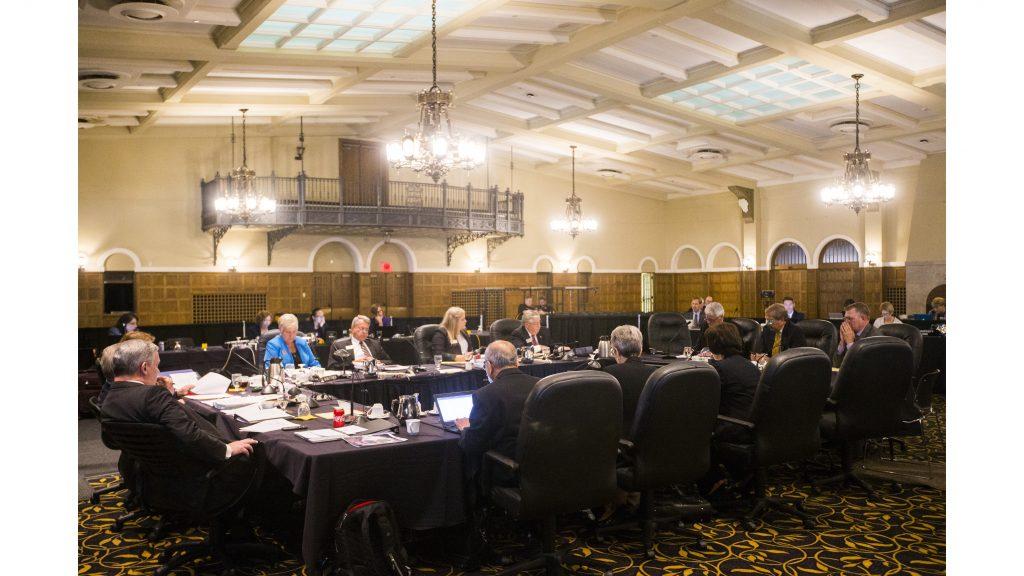Judge affirms state board’s remedy for Iowa regents in collective-bargaining dispute
A judge ruled that harsher consequences on the state Board of Regents for preempting a 2017 collective-bargaining law were impractical for a public-employee relations board to implement.
Regents listen to a presentation during a state Board of Regents meeting in the IMU main lounge on Thursday, Sept. 7, 2017.
January 16, 2020
A district judge has affirmed an Iowa Public Employment Relations Board decision that the state Board of Regents negotiated in bad faith with two public-sector employee unions at the University of Iowa and the University of Northern Iowa, but ruled that the employment-relations panel could not fully remedy the situation.
The Iowa Public Employment Relations Board ruled in June 2019 that the regents failed to negotiate in good faith with the UI Campaign to Organize Graduate Students and UNI’s United Faculty. The panel ordered the governing board of Iowa’s three public universities to “cease and desist” and required the regents to post a public notice on the UI and UNI campuses for 30 days.
United Faculty in August 2019 asked a judge to reverse the Iowa Public Employee Relations Board’s decision and set further legal proceedings to consider seeking “an enlarged remedy” from the regents. Although 5th District Judge Jeffrey Farrell agreed that the regents’ bargained in bad faith, he wrote in a ruling filed Jan. 13 that the panel’s initial decision was supported by reason and evidence.
The case arose due to the regents’ failure to “actively and substantially discuss” the 2017-19 contract while a collective-bargaining bill affecting contract negotiations for Iowa’s public-sector employees was moving through the state Legislature, according to the panel’s decision.
Between January and the time the bill was signed in February, the panel determined that the regents demonstrated “a lack of commitment to the process.” The panel emphasized that the anticipation of a bill being passed does not justify acting premeditatively on it.
The judge agreed, noting that the bill was introduced and passed in an “uncommonly short time,” which he said suggested that United Faculty would not anticipate the amendments to the bargaining law so soon, and limiting the organization’s ability to bring issues to the table.
RELATED: State Board: Regents engaged in bad-faith negotiations with COGS
“[The regents were] clearly delaying the process to allow time for the legislative process to work,” the judge wrote. “In contrast, there was little United Faculty could do to speed up the process by the time it learned that the legislation was imminent.”
While United Faculty asked the judge to force the regents to negotiate with the union as if under the old collective-bargaining law, Farrell wrote there is no real way to put both parties in the same position and know whether or not they would have been done with negotiations by Feb. 17, 2017 — the day the new law was passed.
The old law required that the regents and unions come to a collective-bargaining decision by March 15, 2017. If the law had passed after that date, the judge wrote, it would not have affected current negotiations with public bodies.
“… The Legislature jumped on its opportunity and passed the law well-before the statutory deadlines for negotiations,” the judge wrote.
RELATED: COGS, Board of Regents kick off contract negotiations
It is unlikely that the two parties will come to a contract agreement two years later, he continued, even if the court could hypothetically set up a 24-day period for new negotiations. It is also “unrealistic” to believe the parties could complete the collective-bargaining process within that time frame, he wrote.
Overall, the court considers the timing of the new law’s passage to be the “major obstacle” in giving United Faculty its proposed remedy. The panel’s decision to impose a “cease and desist” order instead of resetting the clock for negotiations was due to the impracticality of the latter.
“It is unfortunate that some intermediate remedy does not exist to impose consequences on [the regents] to prevent a similar violation in the future,” the judge wrote.



